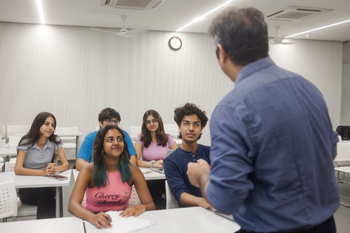by Michelle Miller, AIWC Cologne
I recently heard a podcast opining on the downfall of civilizations throughout history. The speaker argued that one hallmark of the end of a previously strong civilization was the disappearance of critical thinking in the populace. This caught my attention since I always tried as a Professor of Legal Studies to impress upon my students the importance of critical thinking. While it is an important skill for a lawyer, that was not my reason for teaching it. My colleagues and I in the College of Arts and Sciences at our university often discussed what we perceived as a lack of critical thinking skills among the students. Specifically, it seems that they fail to grasp the difference between fact and opinion and accept any information phrased as factual without questioning its source.
 In an age in which there is a great deal of information readily available on the internet, much of it from questionable sources, the blithe acceptance of everything read as fact without consideration of the source, should give us all pause. Down that path lies the devaluation of expertise in which anyone can claim knowledge simply because they believe something is a certain way. In other words, opinion begins to be accepted as fact. While anyone claiming to be an expert should be carefully and thoroughly examined as to the bases for their factual assertions, it goes much too far to treat someone, who has studied and had experience in a given field, the same as someone who simply has an opinion about the topic. If everyone is an expert, then no one is an expert!
In an age in which there is a great deal of information readily available on the internet, much of it from questionable sources, the blithe acceptance of everything read as fact without consideration of the source, should give us all pause. Down that path lies the devaluation of expertise in which anyone can claim knowledge simply because they believe something is a certain way. In other words, opinion begins to be accepted as fact. While anyone claiming to be an expert should be carefully and thoroughly examined as to the bases for their factual assertions, it goes much too far to treat someone, who has studied and had experience in a given field, the same as someone who simply has an opinion about the topic. If everyone is an expert, then no one is an expert!
But what does this have to do with academic freedom and citizenship? It should be obvious that a democracy filled with well-informed citizens makes better choices than one in which citizens make choices based on anything they read without regard for the strength of the source material. The connection between citizenship and academic freedom may be less obvious. Indeed, from some conversations I have had, it seems that some people think academic freedom is the demand by university professors to teach anything they like to impressionable young people. I can assure you that any decent college or university is monitoring their faculty to ensure that well-established facts are being taught and that opinions are being exchanged in an open, fair environment. Academic freedom has more to do with the scholarship done by professors. It allows them to conduct research and publish their findings in any area in which they see a need for more knowledge. Their discoveries can then be used to advocate for improvements for all of society. For example, I worked together with a colleague in Nursing to research the experiences of nurses and nursing students with disabilities. We considered whether the law (primarily the Americans with Disabilities Act) accomplished its goal of integrating into the field of nursing, smart, talented people who happened to have disabilities. Our results led us to some improvements that could be made to help nurses with disabilities, as well as the field of nursing in general, and we advocated for those changes nationwide.
Now imagine a country in which the government got to decide what topics were suitable for academic research, who could be admitted as a student, what disciplines could be taught and what topics were appropriate for academic discussion. What if this hypothetical government did not believe that resources should be spent on citizens with disabilities and thus did not permit professors to conduct research relating to disability law? It would become impossible to prove that people with disabilities make society better when they have the means to fully participate. Now multiply this one small example by all of the ways in which scholars are working to contribute to a better society. Academic freedom is not about some stuffy professors teaching crazy ideas. It is about scholars making discoveries that at the very least add to the discussions a democracy should be having about how to spend finite resources.
One more thing – if academic freedom is curtailed, just how long do you think it will take for this hypothetical government to forbid the teaching of critical thinking as too dangerous? And without critical thinking, what happens to the need for a well-informed citizenry to support the foundations of our democracy?
Photo from Canva


